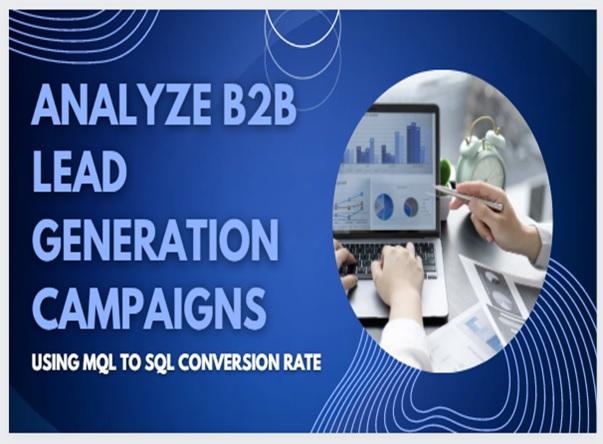Analyze B2B Lead Generation Campaigns
Every B2B company would be interested in knowing the conversion rate from Marketing Qualified Leads (MQL) to Sales Qualified Leads (SQL).
It helps evaluate how well their marketing and sales activities, including B2B lead generation campaigns, are working. But after you've got qualified leads, what should you do?
Let's have an overview.
MQL and SQL are both leads, but if you know how this particular conversion rate can impact your marketing and sales initiatives, you can measure your campaigns and other activities effectively.
Continue to read this article to find out more about it.
What Are MQL And SQL?
Before discussing the conversion rate, first, let's have a brief idea of MQLs and SQLs and what they are.
- Marketing Qualified Leads (MQLs) are the particular leads that suit your buyer persona. They are found at the top of your sales funnel. Therefore, they are still not ready for your sales team's direct involvement. If they do not show buying intention, your marketing team needs to put more effort before your sales team actively engages with the leads.
- Leads pre-qualified by the sales team are known as Sales-Qualified Leads (SQLs). In a B2B lead generation business, the sales team uses SQLs as a lead to assess their target market and other factors. Near the bottom of the sales funnel are SQL contacts. Therefore, they are pushed back to purchasing your product or service.
In simpler words, the MQL to SQL conversion rate refers to the ratio of Marketing-Qualified Leads (MQLs) to Sales-Qualified Leads (SQLs). It's one of the finest methods for figuring out the caliber of a lead and a great sign of how well your team qualifies and prioritizes leads to keep the sales pipeline of high-potential prospects.
How Can You Calculate MQL To SQL Conversion Rate?
To start, you must count the MQLs, and SQLs produced during a specific time frame. Since the percentage of MQLs converted to SQLs is known as the MQL to SQL conversion rate, the formula below can be useful to calculate this conversion rate:
Formula
For instance, your MQL to SQL rate would be 50% if you successfully convert 40 out of 80 leads produced over a quarter-long sales effort into actual sales. This rate indicates that you turn 5 out of every ten leads into sales on average.
Seeking professional assistance is a common practice when businesses aim to optimize their lead conversion rates. You can easily boost your sales with a skilled lead generation specialist who understands how to identify high-quality prospects and nurture them effectively. Their expertise can streamline your sales funnel, ensuring that potential leads are engaged and guided towards making a purchase. This not only improves your MQL to SQL rate but also enhances overall revenue generation for your business.
What Is The Significance Of MQL To SQL Conversion Rate In Your B2B Lead Generation Business?
It is advantageous to track the conversion rate between each step, especially for businesses with longer sales cycles and several sales stages.
For example, how frequently do net new leads become a sales-qualified pipeline? The MQL to SQL conversion rate is one of the influential sales metrics to measure such moves while you focus on B2B lead generation processes.
If your business is in the same old position with fewer leads in the pipeline, you might need a fresh approach to B2B lead generation and client conversion. So, if you haven't considered this conversion rate, it’s time you should because:
- This metric is a powerful technique that businesses use to assess the effectiveness of their sales staff.
- In addition to assisting you in evaluating the success of your marketing initiatives, MQL to SQL conversion rate also helps boost conversions.
To increase the conversion of SQLs from MQLs,
- Find the root causes of the low MQL/SQL conversion rate.
- Use a line graph or a summary chart to visualize this conversion rate.
- Personalize emails for lead nurturing.
- Ask for feedback from your existing clients.
Make improvements wherever and whenever necessary, increasing the efficiency of your B2B lead generation agendas.
Concluding the post, analyzing conversion rates such as MQL to SQL rates shows a direction of where your sales and marketing team efforts go. Sales teams can monitor the sources of prospects in the sales funnel to understand which sources often result in new clients, which get stalled, and which are lost.

